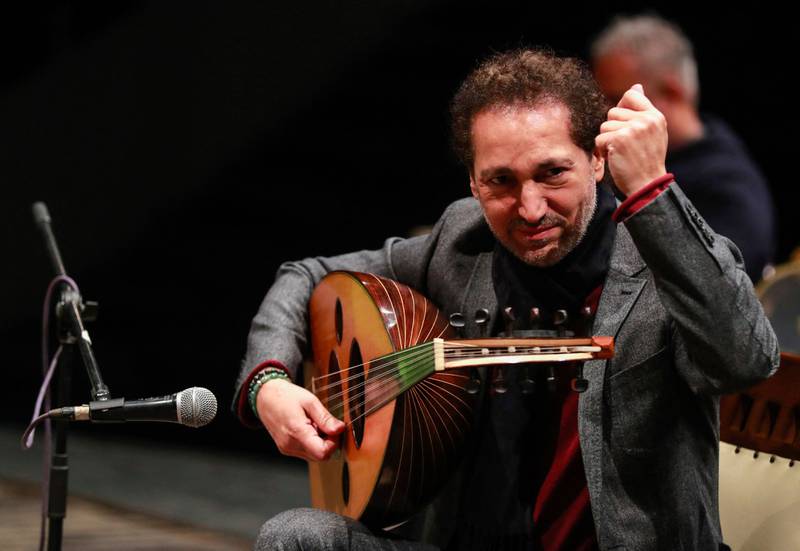Iraqi oud legend Naseer Shamma seeks to heal Baghdad's wounds with music

Celebrated Iraqi oud player Naseer Shamma warmed up Baghdad’s cold winter nights over the weekend with soulful musical compositions that not only caught the ears of his audience but also their hearts. Teaming up with the newly founded National Ensemble of the Iraqi Musical Heritage for a concert series, the virtuoso played emotive melodies on the oud interwoven with old folk songs.
The concert at the National Theatre sent a shiver down audience members' spines, as the crowd collectively burst into applause, with many shouting words of praise. Some couldn’t hold back their tears.
He opened the concert by playing Good Morning Baghdad with mournful tremolos on oud. It brought a nostalgic air that made the audience cheer loudly, humming and swaying their heads.
Next came At the Edge of Pain as a “salute from Baghdad to Palestine, the women of Palestine and the children of Palestine”. Among other compositions, he also played The Cities of Daffodils, which he composed for the historic Erbil Citadel in the northern Kurdish region after it was designated a Unesco World Heritage Site.
Shamma, 59, received a diploma in music in 1987 from the Institute of Music Studies in Baghdad, specialising in the oud. That same year, he won the Best Emotional Melody in Iraq for a romantic song.
That kicked off a long and illustrious career, during which he has performed countless concerts in countries across the world and received more than 60 awards.
To promote the region’s talents and develop a new generation of musicians, he established Bait Al Oud, or The House of Oud, in several countries, including Cairo and Abu Dhabi. It provides music education not only on his chosen medium but on a variety of other traditional Middle Eastern instruments. Throughout his career, Shamma has always prioritised his contribution to promoting peace and raising funds for long-vetted projects that serve his humanitarian vision.
Since the 1990s, he has led many efforts for his fellow Iraqis who have endured harsh UN-imposed economic sanctions, war and instability, regularly going back to visit the country after leaving in 1993.
In 2015, he launched the Ahalna Campaign to financially support families uprooted from their homes following the 2014 ISIS onslaught in northern and western Iraq.
Two years later, he started Alaq Baghdad with the aim of rehabilitating the city's main squares and streets to spur investment. In co-operation with his main partners – a group of private banks and companies as well as the Ministry of Culture – the initiative has succeeded in renovating a number of squares and streets. In 2017, Shamma was named a Unesco Artist for Peace.
The recent concerts, too, will go towards rehabilitating the Institute of Music Studies and the Music and Ballet School in Baghdad. “We are working on developing every place in Iraq that we can perform in,” Shamma told his audience, also unveiling a plan to build a big hall for plastic arts.
“We’ve succeeded in leaving humanitarian, cultural and artistic touches here and there by using all the capabilities to preserve the formidable diversity in Iraq,” he said.
“We have to be proud of all the beauty and culture in Iraq. They are the strength points of this country, which for the past 8,000 years has been home for great civilisations." Shamma recalled the lavish inauguration of the National Theatre during the 1980s, promising more efforts to rehabilitate theatres.
“Lighting a theatre will help the people recovering,” he said. “We have to look for the positive aspects and guide them out of the darkness into a horizon full of light, beauty, music, art, theatre and cinema."
Following the 2003 US-led invasion of Iraq that toppled Saddam Hussein, cultural life diminished in Baghdad and other cities. But when security started to prevail in late 2007 and early 2008, life returned gradually with many music performances, cinemas, art exhibitions and concerts by Arab singers, including Lebanese pop star Elissa.
Despite a volatile political and security environment and attempts by radical clerics to stop such concerts, Iraqis have grown determined to see them through. “Whenever we mention Baghdad, we mention art and culture,” concertgoer Mohammed Abbas Mohammed, 32, told The National after Thursday's show.
“Since its establishment by Abbasids and the ages that followed, Baghdad has stood as a metropolis despite the invasions and occupations it endured.” For him, the presence of artists such as Shamma in Baghdad is “a glimmer of hope”, while hosting such events is “important for life to return to normal in Baghdad and spread hope in all its corners”.
Veteran Iraqi actress Sanaa Abdul-Rahman said the concerts have “renewed vigour” in Baghdad. “You can feel the soul and life of any country only through music,” she said. “If we want security to prevail on this Earth then music and art are the main means. “We have a civilised country, but the obscurantists want to prevent us from joy, smiling and life."
That's a major reason why The National Ensemble of the Iraqi Musical Heritage was established in late 2020 by the renowned maestro Alaa Majeed. It is made of young musicians, including women, which is now unusual for the country.
Shamma said he was overwhelmed by the presence of female musicians who played the oud, santoor and qanun. “Iraqi girls are back again playing on musical instruments and that’s astonishing,” he said, and the audience again burst into applause. “This picture must not be erased from Iraq."
